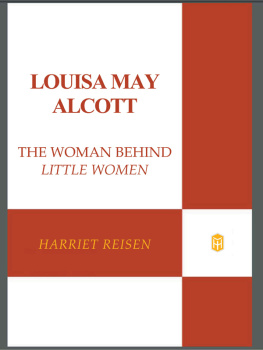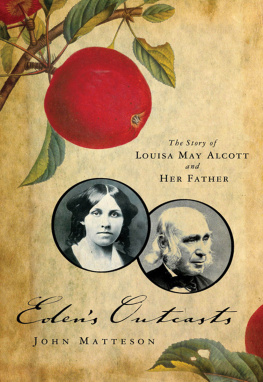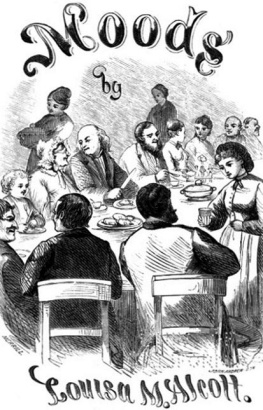LOUISA MAY ALCOTT, DREAMER AND WORKER
A Story of Achievement
BELLE MOSES

This 2011 edition published by Barnes & Noble, Inc.
All rights reserved. No part of this publication may be reproduced, stored in a retrieval system, or transmitted, in any form or by any means, electronic, mechanical, photocopying, recording, or otherwise, without prior written permission from the publisher.
Barnes & Noble, Inc.
122 Fifth Avenue
New York, NY 10011
ISBN: 978-1-4114-5449-1
INTRODUCTION
L OUISA M AY A LCOTT occupies a niche peculiarly her own in the hearts of American girls. No writer of fiction, before her time or since, has been able to touch the responsive chord that Miss Alcott struck in "Little Women" and the many succeeding girls' stories. Her charm lay, not in plot nor excitement, but in the natural, healthy, everyday life she spread out before her readers. Incidents drawn freely from her own and her sisters' lives formed the framework of "Little Women," and through her stories, long or short, runs this vein of reality.
From her obscurity as a struggling author she sprang to the first place, and her name has since become a household word. And so I should like to introduce Miss Alcott to her girl friends as a girl like themselves, who worked, who struggled, and who conquered by sheer force of energy and perseverance, not by the great things she did, but by the little things that counted most. Forty years ago "Little Women" made its bow to the world, and forty years hence it will still be found on our girls' bookshelves, as fresh and vigorous as ever.
Miss Alcott wrote as Shakespeare did, for all time and all generations. The element of immortal youth is in all her work, and abounds throughout the story of her life, which the following pages will strive to tell.
In the preparation of the book I have been indebted to Messrs. Little, Brown & Co., The Ladies' Home Journal, my brother, Montrose J. Moses, and the writings of Mrs. Cheney, Mrs. Porter, Mrs. Clarke, F. B. Sanborn, Miss Cate, and others, whose intimate knowledge of the author and her life has been of great assistance to me.
BELLE MOSES.
NEW YORK, June 1909.
CHAPTER I
LOUISA MAY ARRIVES
NOVEMBER'S child of many moods arrived on the 29th day, 1832, sharing the birthday of her father and Christopher Columbus, if we can believe the records, and she first opened her eyes in a large, square, old-fashioned house in old-fashioned Germantown, not far from Philadelphia. It was somewhat off the main street, and was known as The Pinery or Pine Place, because of the pines surrounding it, so Louisa's tiny nose sniffed the sweet, pungent odor before she even thought it worth while to take a peep at the world.
Her father and mother, being old-fashioned people, were delighted with the new baby, who would be such a fine playmate for little Anna, just two years old, and though they were as poor as poor could be, they welcomed the newcomer with all their loving hearts, little dreaming that she would prove to be a regular fairy luck child.
The first thing she did of any consequence was to send her regards to her grandfather, Colonel May, to whom Mr. Alcott wrote at once, announcing her arrival. At the end of the letter he says:
"With Abba's [Mrs. Alcott's], Anna's, and Louisa's regards, allow me to assure you of the sincerity with which I am,
"Yours,
"A. B RONSON A LCOTT ."
How quaint and stiff and formal those old-time letters were!
By all accounts Louisa was a beautiful baby, a delight to play with, to cuddle, and to kiss. And though Germantown happened by accident to be her birthplace, she wasfrom the crown of her head to the toes of her active feetof sturdy New England stuff.
Her father, Amos Bronson Alcott, was born in 1799, thirty-three years before Louisa came, at the foot of Spindle Hill, in the region called New Connecticut. His family name in the old English records had been Alcocke, and belonged to a line of English gentlemen who came over to America and took up farming in New England. Some called the name Alcox, but when Amos Bronson and his cousin William set out to seek their fortunes, they changed it to Alcott; while another branch of the family called themselves Olcott.
Mrs. Alcott was the twelfth and youngest child of Colonel Joseph May, and was related also to the Quinceys and Sewalls of Massachusetts fame. Her brother, Samuel J. May, was a Unitarian minister, and a very prominent man in his daya day of many great men. Mrs. Alcott was a woman of grace and refinement, so little Louisa and her sisters, the four "Little Women"Meg, Jo, Beth, and Amyso dear to every girl's heart, had a rich heritage by birth, no matter how little they had of other riches.
Mr. Alcott was teaching school when Louisa was born, but he had new ways of teaching which the stolid Germantown people did not like, so his school was not successful, and he moved to Boston when Louisa was two years olda chubby little mischief, who "got lost" on her very first journey.
They traveled by boat from Philadelphia to Boston; Anna and Louisa, spick and span, in clean nankeen suits, when it was suddenly discovered that Louisa was missing. High and low they searched, until at last they found her in the engine room, placidly poking into places that were "all nice and dirty"looking, no doubt, "all nice and dirty," too. How she came there she never explained; she might have been on a voyage of discovery, or made friends with the engine man, or wanted to "see the wheels go round," for she was of a most inquiring mind, but at any rate she had enjoyed herself.
In Boston the real home life began. It would have been hard to find a happier couple than Mr. Alcott and his wife, and the two little girls grew and expanded in an atmosphere of love and intelligence. Mr. Alcott became head of the Temple School, where he felt free to teach his new ideas in his own way; but Louisa was too young to attend school except for an occasional visit, though her education began at an unusually early age. Kindergartens were unknown in those days, yet Mr. Alcott was ahead of his time and had real kindergarten ideas about making study pleasant for the children, whose quick minds flew to knowledge. Two more little girls were added to the family group. Elizabeth, the Beth of "Little Women," was born during the six years spent in Boston; there was also a tiny boy who never lived; then came Abbey May, the baby and pet of the family, Amy in the story, who was born in the happy Concord days that immediately followed the unfortunate years in Boston.
Louisa at a very early age began to have "thinks," one could scarcely call them thoughts, for they went on all the time and were too large and indefinite to classify. This small person, in moments when her animal spirits were not leading her into paths of strange adventure, was much given to reflection; her little soul was a turbulent, unruly thing; she was often sad because of it, and had her fits of gloom like many an older person. But a whiff of fresh air, a kindly word, the sense of human companionship and sympathy, worked a magic cure, and she would be once more the hearty, happy child, who "loved everybody in dis whole world."
Such a nature as hers could not have had two better guides. Her father encouraged this habit of reflection, and discussed her small troubles with her as gravely as he handled heavier matters, while her mother steered her safely through the practical details of her daily life, each fired with the unselfish desire to give the best to the little girl.


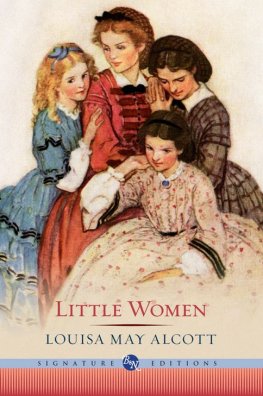


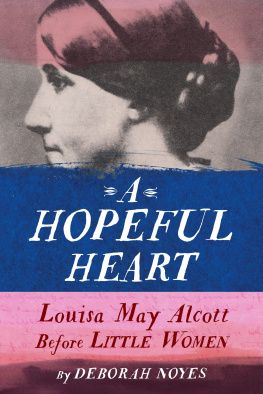

![Alcott - Louisa May Alcott: [a personal biography]](/uploads/posts/book/163779/thumbs/alcott-louisa-may-alcott-a-personal-biography.jpg)
